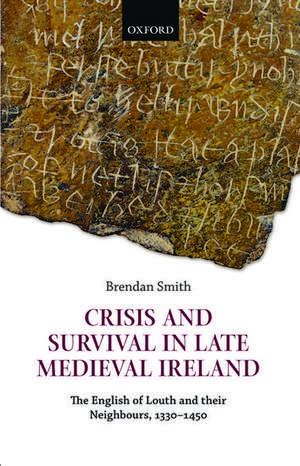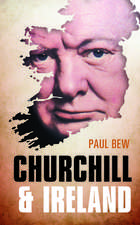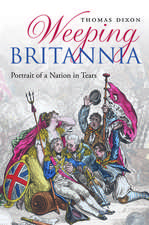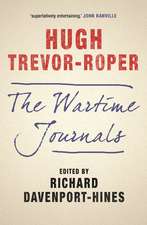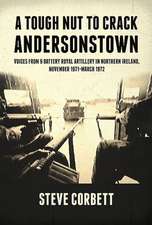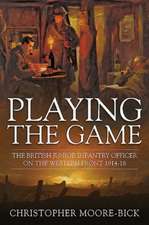Crisis and Survival in Late Medieval Ireland: The English of Louth and Their Neighbours, 1330-1450
Autor Brendan Smithen Limba Engleză Hardback – 19 iun 2013
Preț: 819.26 lei
Preț vechi: 1177.50 lei
-30% Nou
Puncte Express: 1229
Preț estimativ în valută:
156.81€ • 170.39$ • 131.81£
156.81€ • 170.39$ • 131.81£
Carte tipărită la comandă
Livrare economică 10-16 aprilie
Preluare comenzi: 021 569.72.76
Specificații
ISBN-13: 9780199594757
ISBN-10: 0199594759
Pagini: 280
Ilustrații: 6 maps, 4 tables
Dimensiuni: 162 x 240 x 24 mm
Greutate: 0.61 kg
Editura: OUP OXFORD
Colecția OUP Oxford
Locul publicării:Oxford, United Kingdom
ISBN-10: 0199594759
Pagini: 280
Ilustrații: 6 maps, 4 tables
Dimensiuni: 162 x 240 x 24 mm
Greutate: 0.61 kg
Editura: OUP OXFORD
Colecția OUP Oxford
Locul publicării:Oxford, United Kingdom
Recenzii
An outstanding piece of local history based upon extensive archival and secondary research, and supported by a full scholarly apparatus of maps, footnotes, bibliography, and index ... Highly recommended.
Smith has thus produced a work with broad appeal and provides food for thought. Highly recommended.
...a painstakingly well-researched and scholarly work that will quickly become indispensable to historians of later medieval Ireland. The truly impressive prosopographical work that Smith uses as the backbone of his study is characterized by a level of detail and specificity missing from many studies of regional communities and provides an excellent roadmap for such research going forward.
This study is a model of how medieval history should be written, whereby the experience of one local community illuminates a much broader landscape.
carefully nuanced study ... rich in ideas and evidence ... deserves the close attention of everybody interested in the modulations of government and society across the dominions of the late medieval English crown.
Brendan Smith has made a major contribution to the study of English communities in medieval Ireland, illustrating the resilience of their identity despite the challenges that faced them on the march or in the council chamber.
What is impressive here is Smith's control of scattered and often fragmentary archival sources.
Smith has thus produced a work with broad appeal and provides food for thought. Highly recommended.
...a painstakingly well-researched and scholarly work that will quickly become indispensable to historians of later medieval Ireland. The truly impressive prosopographical work that Smith uses as the backbone of his study is characterized by a level of detail and specificity missing from many studies of regional communities and provides an excellent roadmap for such research going forward.
This study is a model of how medieval history should be written, whereby the experience of one local community illuminates a much broader landscape.
carefully nuanced study ... rich in ideas and evidence ... deserves the close attention of everybody interested in the modulations of government and society across the dominions of the late medieval English crown.
Brendan Smith has made a major contribution to the study of English communities in medieval Ireland, illustrating the resilience of their identity despite the challenges that faced them on the march or in the council chamber.
What is impressive here is Smith's control of scattered and often fragmentary archival sources.
Notă biografică
Brendan Smith received his B.A. (Mod.) and Ph.D. from Trinity College Dublin and held a postdoctoral Newman Scholarship at University College Dublin before taking up a lectureship at the University of Bristol in 1993.
